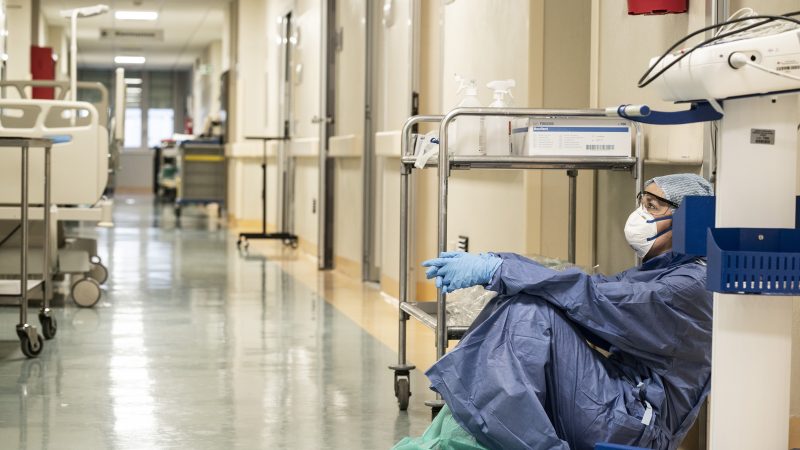'A public inquiry needs to go deeper and consider the effects of government economic policies, corporate profiteering and low pay on daily life.'

Prem Sikka is an Emeritus Professor of Accounting at the University of Essex and the University of Sheffield, a Labour member of the House of Lords, and Contributing Editor at Left Foot Forward.
The UK death toll from Covid has already exceeded 176,000 and will probably go even higher. By March 2021, more than 39,000 care home residents have died. It is a tragedy for millions of people who have lost their loved ones. A public inquiry is needed into the government’s handling of the pandemic.
The UK death-toll is one of the highest per capita in Europe and the inquiry needs to seek answers. A conventional analysis will focus on the poor state of the National Health Service (NHS), chaos of the test-and-trace programme, lack of personal protection equipment and ministerial dithering. But it needs to go deeper than that and consider the effects of government economic policies, corporate profiteering and low pay on daily life.
Low income leading to poor nutrition and housing is a recurring factor in the deaths of thousands of people. Poor levels of nutrition affect the physical ability to fight infections. Poor and cramped housing does not enable people to isolate from other family members and increases the risk of spreading infections. This is the outcome of policies pursued by government and employers
Nearly 70% of the Covid deaths have been among those aged 75 or older, barely surviving on low state pension. The weekly median state pension of between £150.25 and £178.52 condemns millions of retirees to poverty. Malnutrition (or “undernutrition”) affects over 3 million people in the UK, including 1.3 million retirees. Those already weakened by poverty become easy victims of Covid.
Low-paid workers in the state and the private sector kept the economy going but have remained at a higher risk of death. Nearly a million people are on zero hours contracts and can’t afford to take time out to isolate. Ethnic minorities and women are particularly exposed to low pay and zero hour contracts.
Almost three-quarters of frontline care workers in England receive less than the “real” living wage. Local authorities are responsible for providing social care, but since 2011 central government funding has been reduced by 38% in real-terms. In turn, local authorities negotiate hard bargains with the private sector providers who in turn squeeze labour by paying low wages.
Poorly paid care workers are twice as likely to die from Covid compared to healthcare workers. Around 84% of social care homes are provided by profit-seeking corporations. All too often directors are incentivised to boost profits and dividends. They do so by paying low wages and using a variety of profit shifting techniques. The creation of artificial debt, mostly owed to another member of the group located offshore, is a common technique for siphoning-off resources. The debt charges absorb around 20% of the income. This is in addition to profits of around 10-12%. Altogether, a huge proportion of the fees intended for residential care are siphoned-off. The result is a squeeze on wages and working conditions.
The average hourly rate for a UK Care Assistant is approximately between £8.50 and £9.50. Around 24% of the care workers in England are on zero-hour contracts and the proportion for domiciliary care jobs is around 42%. Low wages and job insecurity deprive people good food and housing, necessary for fighting infections.
The TUC estimates that that 2.7% per cent of the private sector workforce – around 723,900 workers – were off work with Covid-19 just before Christmas. Of this, around 267,800 were self-isolating without decent sick pay or any sick pay. Perhaps, more were infected but chose to continue to remain at work. The only cushion for most workers is the Statutory Sick Pay (SSP) which is currently £96.35 per week. It bears no relationship to the actual earnings of workers.
The SSP is set at 27% of the headline minimum wage and no one can live on it. Employees earning less than £120 a week are not eligible for SSP. Self-employed workers pay national insurance contributions but are not entitled to SSP. Faced with the low rate of SSP and exclusion many sick workers have to work on and that increases possibilities of spreading infection. The folly of low pay and SSP has been exposed with great regularity by the annual flu crisis, but successive governments have failed to make SSP universal or relate it to earnings.
The UK government’s economic policies have contributed to the Covid death toll. The never-ending austerity and wage freezes have impoverished workers and denied good nutrition and housing to their families. People living in cramped conditions cannot easily isolate themselves. Cuts in public expenditure enabled the government to appease the City and hand out tax cuts to corporations and the rich, but inflicted hardships and insecurity on millions of workers.
Thousands of senior citizens already weakened by low pensions have succumbed to Covid. Society looks to the state to save lives, but government cuts in public services and tax gifts for the rich are not accompanied by any analysis showing the impact on the lives of the less well-off. Equitable distribution of income and wealth is an effective way of combating the pandemic, but sadly no political party is currently committed to that.
To reach hundreds of thousands of new readers we need to grow our donor base substantially.
That's why in 2024, we are seeking to generate 150 additional regular donors to support Left Foot Forward's work.
We still need another 117 people to donate to hit the target. You can help. Donate today.



